Application
equipment
In this section you will find a range of practical information related to our solutions. In the articles, we share our experience, discuss implementation steps and highlight good practices. It is a reliable source of information and advice on the provision of drinking water in public spaces, the legal regulations in this area, the benefits of installing drinking water dispensers and the technological aspects in this field.
We look forward to reading!
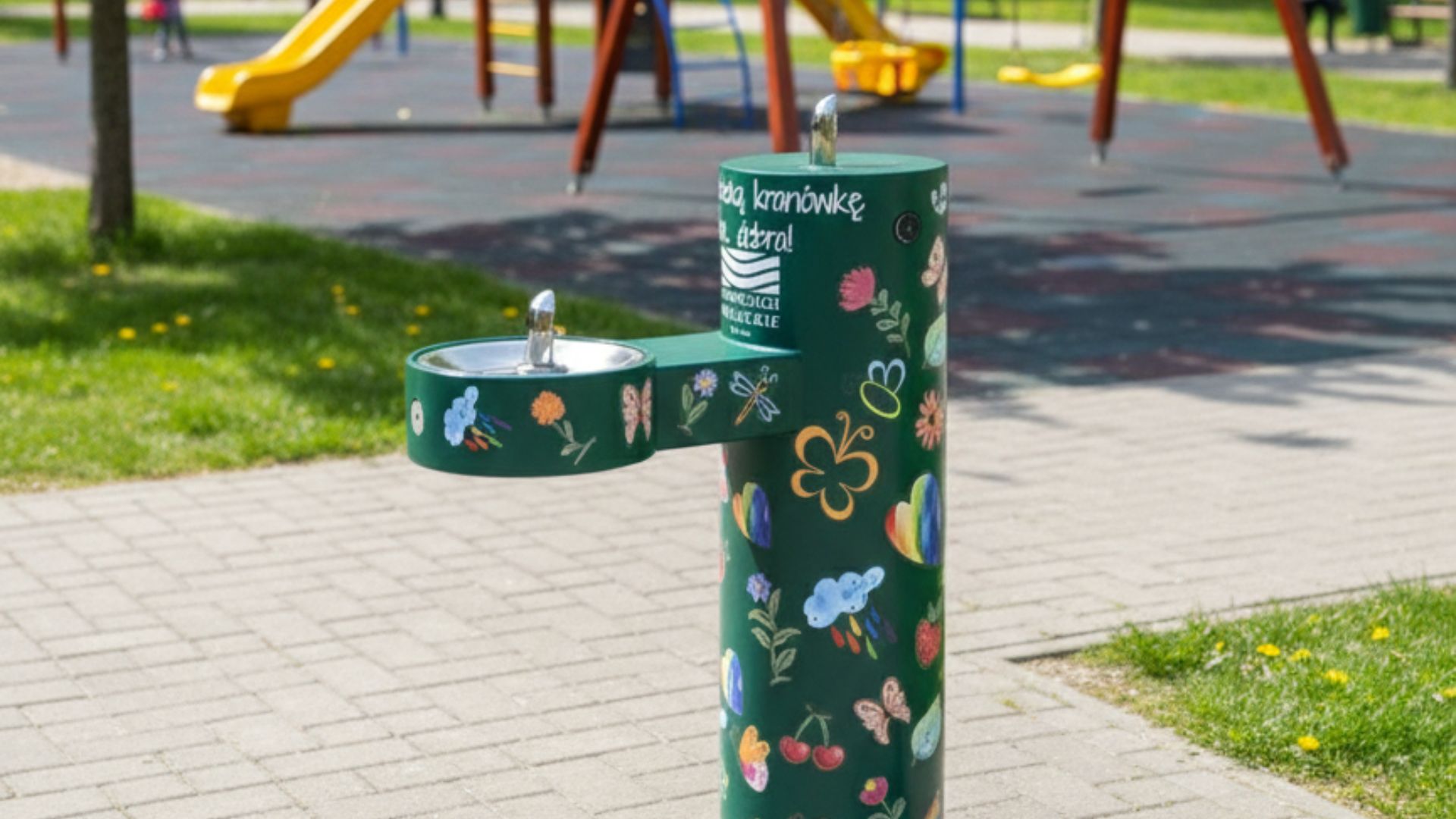
Coraz więcej firm, instytucji i obiektów publicznych szuka rozwiązań, które nie tylko spełniają funkcję praktyczną, ale również wpisują się w charakter miejsca. Personalizacja urządzeń to odpowiedź na te potrzeby – pozwala stworzyć rozwiązania idealnie dopasowane do otoczenia, identyfikacji wizualnej oraz oczekiwań użytkowników.
Każda przestrzeń ma swój styl i wymagania. Dlatego możliwość wyboru koloru, oznakowania czy detali wizualnych sprawia, że urządzenie przestaje być jedynie elementem wyposażenia – staje się integralną częścią projektu. Personalizacja pozwala dobrać kolor z szerokiej palety, dodać logo, grafikę lub własny komunikat, dzięki czemu zdrój wody czy dystrybutor idealnie komponuje się z wnętrzem lub przestrzenią publiczną.
Takie rozwiązanie świetnie sprawdza się zarówno w biurach, szkołach i hotelach, jak i w parkach czy obiektach sportowych, gdzie estetyka i spójność wizualna mają duże znaczenie.
Personalizacja to coś więcej niż wygląd – to także narzędzie marketingowe. Oznakowanie urządzeń logotypem lub dedykowaną grafiką pomaga zwiększyć świadomość marki i wzmacnia jej obecność w przestrzeni użytkowników.
W praktyce oznacza to, że każdy element infrastruktury może wspierać komunikację wizualną firmy. To szczególnie ważne w miejscach publicznych oraz w przestrzeniach o dużym ruchu, gdzie liczy się każdy detal budujący wizerunek.

Personalizacja nie ogranicza się wyłącznie do koloru. Możliwe są różne formy oznakowania – od trwałych naklejek, przez tabliczki, aż po precyzyjne grawerunki. Dzięki temu urządzenia mogą być dostosowane zarówno do subtelnych aranżacji, jak i bardziej wyrazistych projektów.
Proces jest prosty i przejrzysty – wybór modelu, koloru, rodzaju oznakowania, akceptacja wizualizacji i realizacja. Taka elastyczność sprawia, że personalizacja jest dostępna zarówno dla niewielkich zamówień, jak i dużych projektów inwestycyjnych.
Decydując się na personalizację urządzeń, zyskujesz:
Dodatkowo indywidualne projekty pozytywnie wpływają na odbiór miejsca przez użytkowników – pokazują dbałość o detale i podkreślają profesjonalizm organizacji.
Personalizacja urządzeń to rozwiązanie, które łączy funkcjonalność z designem i marketingiem. Dzięki szerokim możliwościom konfiguracji możesz stworzyć produkt dopasowany do swoich potrzeb – zarówno pod względem estetyki, jak i komunikacji wizualnej. Jeśli chcesz, aby infrastruktura w Twoim obiekcie była nie tylko praktyczna, ale również wyjątkowa, personalizacja to krok w dobrą stronę.
In this section you will find a range of practical information related to our solutions. In the articles, we share our experience, discuss implementation steps and highlight good practices. It is a reliable source of information and advice on the provision of drinking water in public spaces, the legal regulations in this area, the benefits of installing drinking water dispensers and the technological aspects in this field.
We look forward to reading!
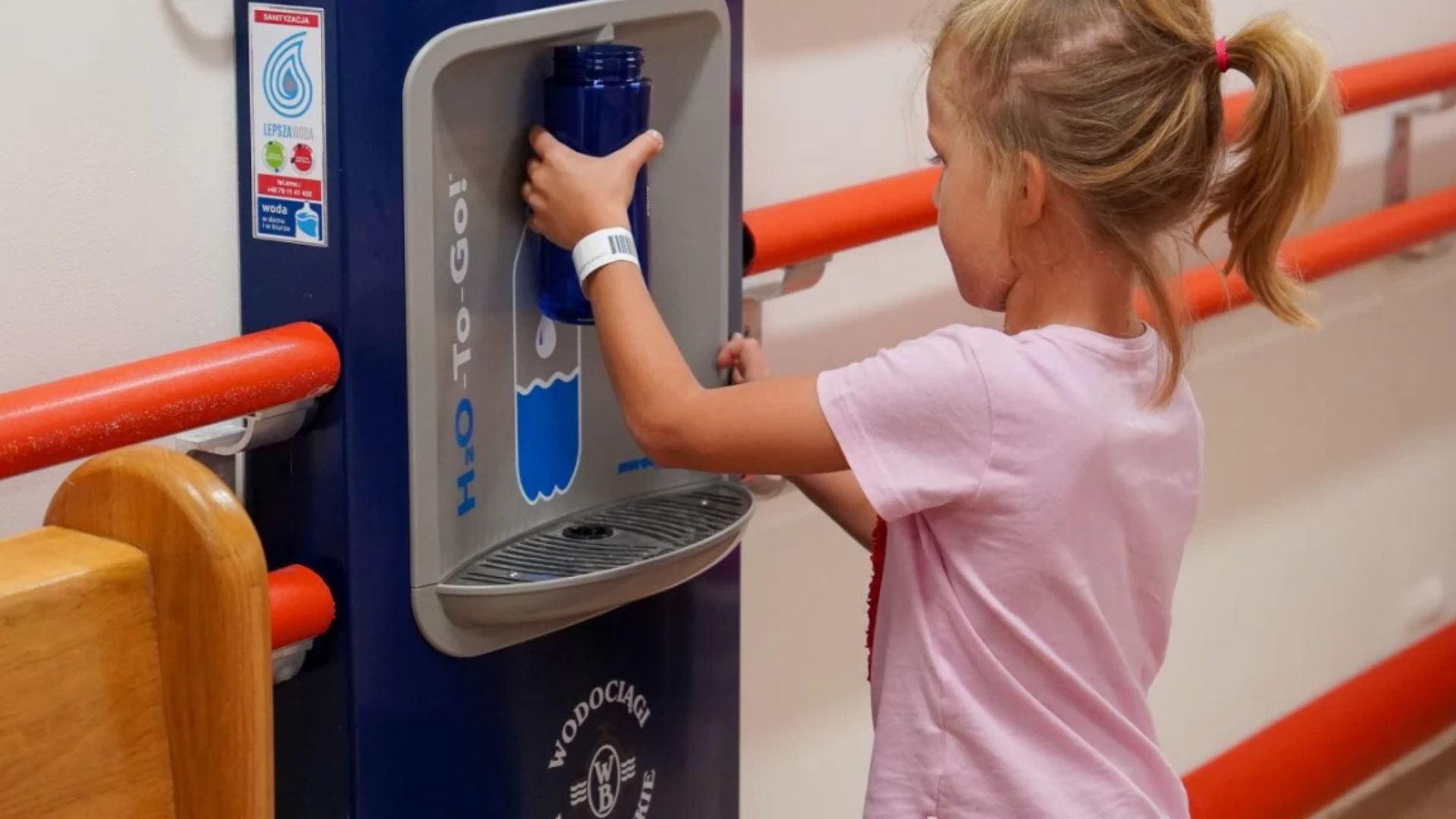
Odpowiednie nawodnienie pacjentów to jeden z kluczowych elementów procesu leczenia i rekonwalescencji. Woda pitna wpływa na funkcjonowanie organizmu, wspiera regenerację oraz poprawia komfort pobytu w placówkach medycznych. Nic więc dziwnego, że temat dostępu do bezpiecznej, wysokiej jakości wody zyskał szczególne znaczenie w kontekście najnowszych regulacji dotyczących żywienia w szpitalach i placówkach medycznych.
Obowiązujące przepisy dotyczące żywienia pacjentów w placówkach medycznych kładą coraz większy nacisk na jakość, bezpieczeństwo oraz dostępność posiłków i napojów, w tym wody pitnej. Szpitale zobowiązane są do zapewnienia pacjentom stałego dostępu do wody, co w praktyce oznacza konieczność wdrożenia rozwiązań zarówno bezpiecznych, jak i ekonomicznych.
Dla wielu placówek oznacza to wyzwanie organizacyjne i finansowe — szczególnie w czasach rosnących kosztów energii, logistyki i materiałów jednorazowych.

Zakup wody butelkowanej to rozwiązanie kosztowne, wymagające magazynowania, transportu oraz generujące znaczne ilości odpadów plastikowych. W porównaniu z tym, woda z sieci wodociągowej, odpowiednio filtrowana i podawana przez dystrybutory, jest wielokrotnie tańsza i bardziej przyjazna środowisku.
Dzięki dystrybutorom wody placówki medyczne:
To rozwiązanie, które realnie wspiera optymalizację budżetu szpitala, bez kompromisów w zakresie jakości.
W środowisku medycznym kluczowe znaczenie ma higiena. Nowoczesne dystrybutory wody są projektowane z myślą o najwyższych standardach bezpieczeństwa sanitarnego. Wyposażone są w:
Dzięki temu dystrybutory spełniają wymagania sanitarne i doskonale wpisują się w potrzeby szpitali, przychodni oraz domów opieki.
Stały dostęp do świeżej, czystej wody pitnej poprawia komfort pobytu pacjentów oraz warunki pracy personelu medycznego. Dystrybutory mogą być umieszczone w oddziałach, poczekalniach czy strefach wspólnych, zapewniając łatwy i szybki dostęp do nawodnienia o każdej porze.
W obliczu nowych regulacji dotyczących żywienia w placówkach medycznych, dystrybutory wody stają się nie tylko praktycznym, ale i strategicznym rozwiązaniem. To sposób na spełnienie wymogów prawnych, poprawę jakości opieki nad pacjentem oraz znaczące oszczędności finansowe.
Bezpieczna, filtrowana woda z sieci, podawana w higieniczny sposób, to standard, który coraz częściej staje się nieodzownym elementem nowoczesnej służby zdrowia.
In this section you will find a range of practical information related to our solutions. In the articles, we share our experience, discuss implementation steps and highlight good practices. It is a reliable source of information and advice on the provision of drinking water in public spaces, the legal regulations in this area, the benefits of installing drinking water dispensers and the technological aspects in this field.
We look forward to reading!
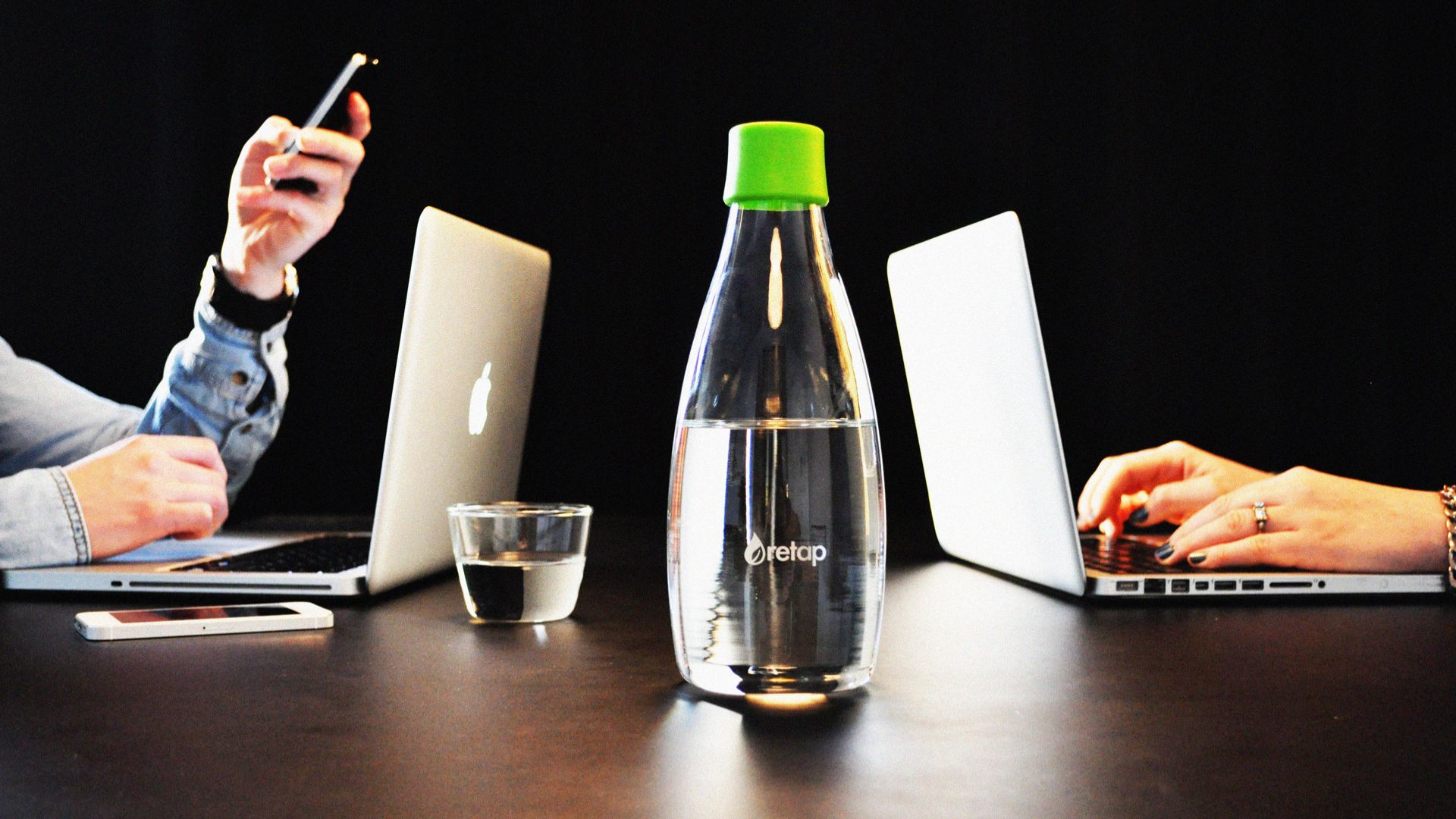
Jeszcze kilka lat temu widok osoby napełniającej bidon w miejscu publicznym należał do rzadkości. Dziś coraz częściej spotykamy uczniów, pracowników biurowych czy spacerowiczów w parkach, którzy zamiast jednorazowej butelki wybierają własny pojemnik wielokrotnego użytku. Ta zmiana nie jest przypadkowa – to efekt rosnącej świadomości ekologicznej, troski o zdrowie oraz coraz lepszej infrastruktury dostępu do wody pitnej.
Polacy coraz częściej rozumieją, że regularne picie wody jest podstawą zdrowego stylu życia. Równocześnie rośnie wiedza na temat negatywnego wpływu plastikowych opakowań na środowisko. Jednorazowe butelki PET, choć wygodne, generują ogromne ilości odpadów, które przez dziesiątki lat zalegają na wysypiskach lub trafiają do środowiska naturalnego.
Bidon staje się więc nie tylko praktycznym akcesorium, ale także świadomym wyborem – symbolem zmiany podejścia do codziennych nawyków. Jednak sama chęć to za mało. Kluczowe znaczenie ma dostęp do bezpiecznej, dobrej jakości wody.
Ogromną rolę w tej zmianie odgrywają dystrybutory wody podłączone do sieci wodociągowej, instalowane m.in. w szkołach, biurach, urzędach czy instytucjach publicznych. Ich obecność sprawia, że picie wody staje się:
W szkołach dystrybutory pomagają kształtować zdrowe nawyki już od najmłodszych lat. Dzieci uczą się, że woda jest podstawowym napojem, a bidon to normalny element szkolnego wyposażenia. W biurach i urzędach dostęp do wody sieciowej wspiera koncentrację, komfort pracy i kulturę dbania o zdrowie pracowników oraz interesantów.
Równie istotną rolę odgrywają zdroje i poidełka z wodą pitną w przestrzeni publicznej – w parkach, na skwerach, trasach rowerowych czy w centrach miast. To one realnie zmieniają sposób, w jaki korzystamy z przestrzeni miejskiej.
Możliwość napełnienia bidonu podczas spaceru czy treningu:
Zdroje miejskie są też ważnym sygnałem: woda z sieci jest bezpieczna, dostępna i wartościowa – nie musi być zapakowana w plastik, by nadawała się do picia.

Zmiana z „butelki” na „bidon” to realny wpływ na środowisko. Każdy litr wody wypity z pojemnika wielokrotnego użytku to:
W skali pojedynczej osoby to drobny gest. W skali szkoły, firmy czy miasta – ogromna różnica, która przekłada się na redukcję odpadów i niższy ślad środowiskowy.
Bidon zamiast butelki to przykład tego, jak infrastruktura i świadome decyzje idą w parze. Dystrybutory wody sieciowej w budynkach oraz zdroje w przestrzeni publicznej nie tylko ułatwiają dostęp do wody, ale realnie kształtują proekologiczne postawy.
To właśnie takie rozwiązania – proste, dostępne i dobrze zaprojektowane – sprawiają, że zmiana nawyków staje się naturalna. A każda napełniona butelka wielokrotnego użytku to krok w stronę zdrowszego społeczeństwa i czystszego otoczenia.
In this section you will find a range of practical information related to our solutions. In the articles, we share our experience, discuss implementation steps and highlight good practices. It is a reliable source of information and advice on the provision of drinking water in public spaces, the legal regulations in this area, the benefits of installing drinking water dispensers and the technological aspects in this field.
We look forward to reading!

Okres ferii zimowych to idealny czas na przeprowadzenie prac technicznych i modernizacyjnych w szkołach. Większość placówek jest w tym czasie całkowicie zamknięta lub funkcjonuje w ograniczonym zakresie, co stwarza doskonałe warunki do spokojnego i bezpiecznego montażu dystrybutorów wody pitnej — bez zakłócania codziennego rytmu zajęć szkolnych.
Brak uczniów w budynku pozwala na dokładne wykonanie wszystkich niezbędnych etapów: od pomiarów i analizy technicznej, przez montaż urządzeń, aż po testy, regulacje i odbiory końcowe. To także doskonały moment na drobny lifting przestrzeni — odświeżenie ścian, montaż estetycznych płyt ozdobnych czy tapet, które sprawią, że strefa z dystrybutorem będzie funkcjonalna i atrakcyjna wizualnie.
Stały i łatwy dostęp do świeżej wody pitnej ma ogromne znaczenie dla zdrowia, samopoczucia i komfortu dzieci oraz młodzieży.
Regularne picie wody:
Dzięki dystrybutorom wody uczniowie chętniej sięgają po wodę zamiast słodzonych napojów gazowanych, co realnie wpływa na ich zdrowe nawyki żywieniowe.
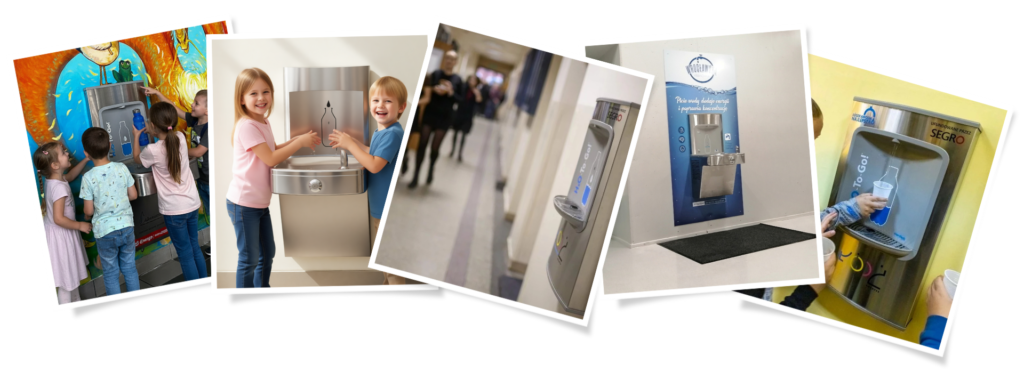
Instalacja dystrybutorów wody pitnej to również konkretne korzyści dla środowiska i organizacji przestrzeni szkolnej:
To prosty, ale bardzo skuteczny krok w stronę zrównoważonego rozwoju i edukacji ekologicznej.
Zapewnienie uczniom dostępu do wody pitnej to nie tylko dobra praktyka, ale również obowiązek dyrekcji wynikający z przepisów prawa. Dystrybutory wody pozwalają w łatwy i nowoczesny sposób spełnić te wymagania, jednocześnie podnosząc standard placówki i jej pozytywny wizerunek w oczach rodziców oraz organów prowadzących.
Oferujemy wieloletnie doświadczenie, sprawdzone technologie oraz najwyższej jakości dystrybutory wody pitnej, dostosowane do potrzeb szkół i placówek edukacyjnych. Nasze urządzenia posiadają:
To niezwykle ważne, ponieważ tylko certyfikowane urządzenia zapewniają pełne bezpieczeństwo użytkowania przez dzieci i spełniają rygorystyczne normy sanitarne obowiązujące w obiektach oświatowych.
Ferie to najlepszy moment, aby bez pośpiechu i utrudnień zadbać o nowoczesne, bezpieczne i ekologiczne rozwiązania w szkole. Montaż dystrybutorów wody pitnej to inwestycja w zdrowie uczniów, komfort codziennego funkcjonowania placówki oraz ochronę środowiska — a przy odpowiednim planowaniu może być połączony z estetycznym odświeżeniem przestrzeni.
In this section you will find a range of practical information related to our solutions. In the articles, we share our experience, discuss implementation steps and highlight good practices. It is a reliable source of information and advice on the provision of drinking water in public spaces, the legal regulations in this area, the benefits of installing drinking water dispensers and the technological aspects in this field.
We look forward to reading!
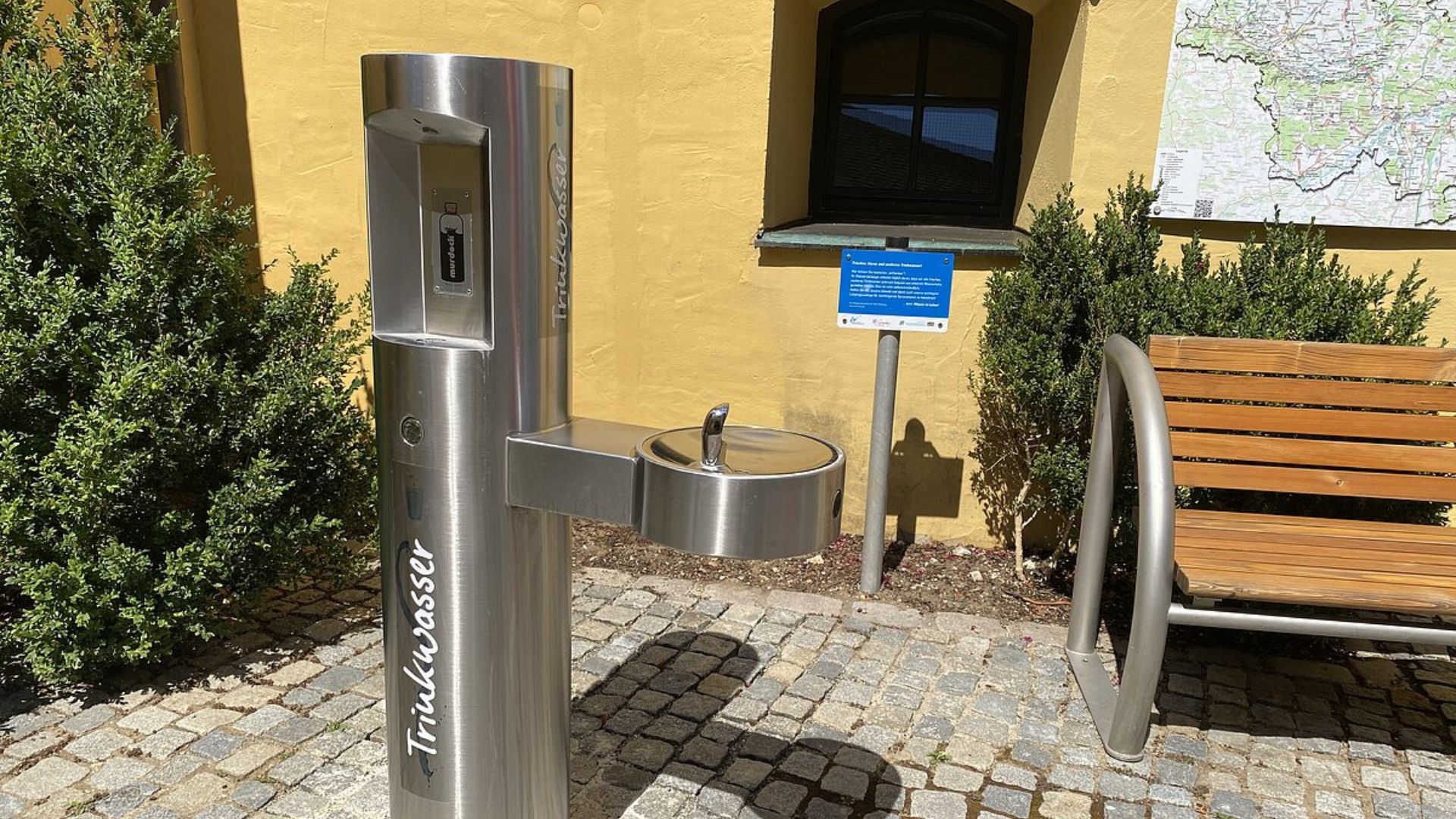
Jeszcze kilka lat temu zdroje wody traktowano jako dodatek. Dziś stają się standardem w dobrze zaprojektowanych parkach, skwerach i strefach rekreacyjnych. Powód jest prosty — zmieniają się potrzeby użytkowników i sposób korzystania z miasta.
Zdrój wody:
Dla projektanta oznacza to jedno: ten element nie może być przypadkowy.
Zdrój musi pasować do otoczenia — parku, placu zabaw czy strefy rekreacyjnej — ale jednocześnie pozostać czytelny i intuicyjny w użytkowaniu. Minimalistyczna forma często wygrywa z nadmiarem detalu, jednak trwałość materiałów jest tu kluczowa.
Jedno z największych wyzwań to dostępność. Zdrój wody powinien być:
To wymaga przemyślanych wysokości, ergonomii i sposobu uruchamiania wody.
Projektanci muszą uwzględniać:
To elementy niewidoczne na pierwszy rzut oka, ale decydujące o jakości projektu.

Zdroje wody pitnej idealnie wpisują się w idee:
Dostęp do darmowej wody:
To przykład rozwiązania, które działa każdego dnia, bez potrzeby kampanii informacyjnych.
Jednym z problemów, z jakimi mierzą się projektanci, jest presja kosztowa. Zdroje wody bywają wykreślane z projektów jako „elementy nieobowiązkowe”. Tymczasem to właśnie one:
To klasyczny przykład niewielkiej inwestycji o dużym zwrocie społecznym.
Zdroje wody w parkach i na placach zabaw pokazują, że dobra architektura nie zawsze musi być spektakularna. Czasem to właśnie detale decydują o tym, czy przestrzeń jest:
Dla architektów i projektantów to wyzwanie, ale też szansa — by poprzez małą architekturę tworzyć lepsze, bardziej odpowiedzialne miasta.
Mała architektura. Wielka zmiana.
In this section you will find a range of practical information related to our solutions. In the articles, we share our experience, discuss implementation steps and highlight good practices. It is a reliable source of information and advice on the provision of drinking water in public spaces, the legal regulations in this area, the benefits of installing drinking water dispensers and the technological aspects in this field.
We look forward to reading!
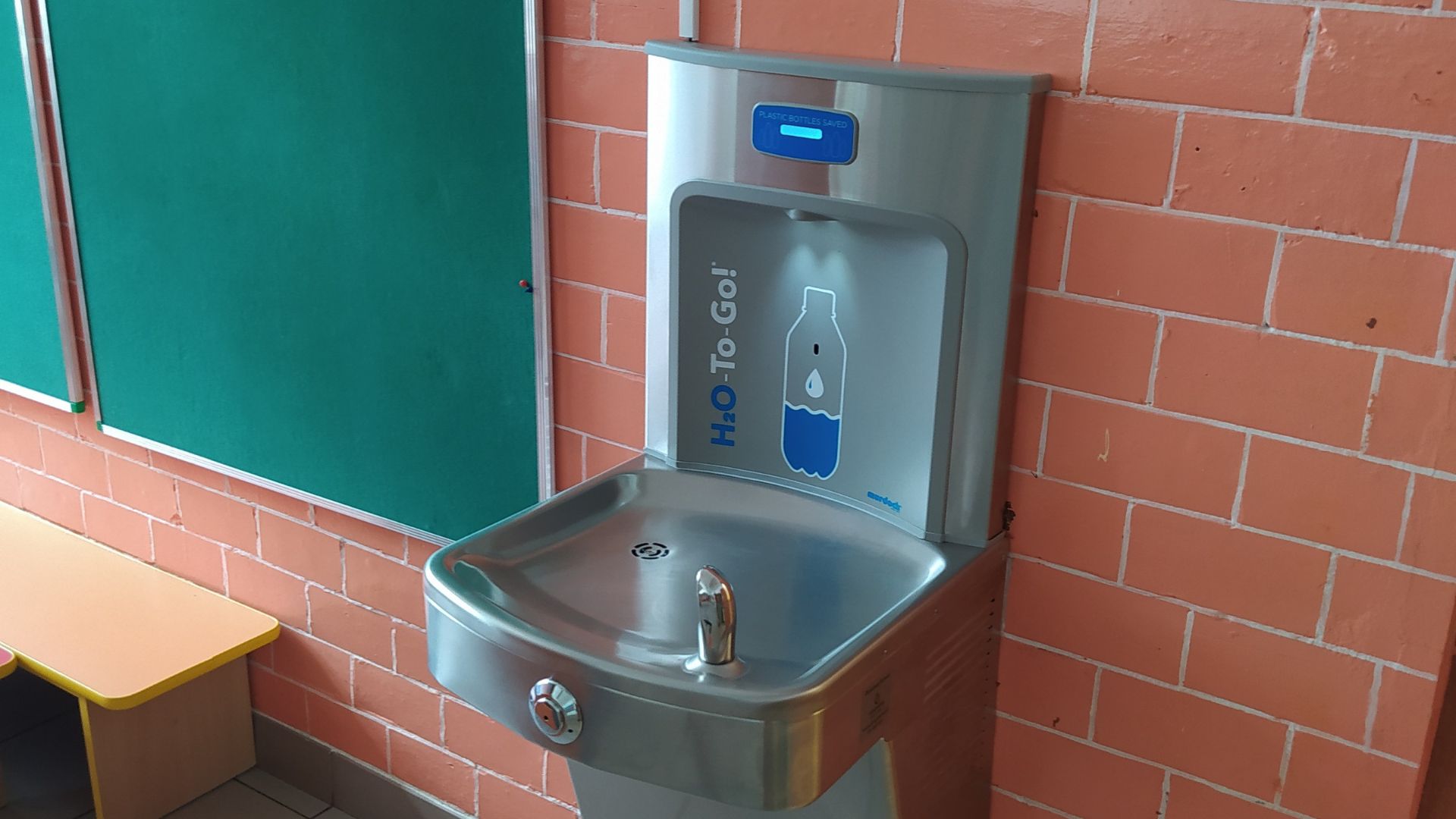
Zimowa przerwa w nauce to nie tylko czas odpoczynku dla uczniów i nauczycieli, ale również doskonała okazja, aby przygotować szkołę na kolejne miesiące funkcjonowania. Jednym z coraz popularniejszych usprawnień, na które decydują się placówki edukacyjne, jest montaż dystrybutorów wody. Ferie zimowe to najlepszy moment, aby takie urządzenia zaplanować, zamówić i zainstalować bez pośpiechu i bez zakłócania szkolnych aktywności.
W czasie przerwy zimowej szkoły pustoszeją, co znacząco ułatwia wszelkie prace instalacyjne. Brak uczniów w budynku pozwala technikom swobodnie rozłożyć sprzęt, wiercić, testować urządzenia i przeprowadzić montaż w pełni bezpiecznie — bez obaw, że hałas zakłóci lekcje czy narazi kogokolwiek na niepotrzebne ryzyko. Dzięki temu dystrybutory wody mogą zostać przygotowane do działania na spokojnie i dokładnie, a po powrocie z ferii na dzieci czeka miła niespodzianka.
Okres przed feriami to idealny moment, aby zastanowić się nad doborem odpowiednich urządzeń oraz nad ich funkcjonalnym i bezpiecznym rozlokowaniem w szkole. Ważne jest, aby miejsce montażu spełniało wszystkie wymogi — dystrybutory nie mogą znajdować się zbyt blisko schodów czy grzejników, muszą mieć zapewniony bezproblemowy dostęp oraz możliwość podłączenia do dopływu wody w odpowiedniej odległości.
Najlepszym sposobem na właściwe dopasowanie lokalizacji jest wizja lokalna z udziałem naszych doświadczonych pracowników, którzy podpowiedzą, jakie rozwiązania sprawdzą się w danej szkole i jakie opcje będą najbezpieczniejsze dla uczniów.

W ZdroJowni dysponujemy dystrybutorami dostępnymi od ręki — urządzenia znajdują się na naszym magazynie i mogą zostać zamówione już teraz. Dzięki temu szkoła ma czas nie tylko na zaplanowanie montażu, ale również na ewentualne przygotowanie dodatkowych elementów, takich jak:
Daje to możliwość stworzenia estetycznego, spójnego i przyjaznego miejsca, z którego uczniowie będą korzystać na co dzień.
Sam montaż przeprowadzony w trakcie ferii zimowych pozwala technikom działać swobodnie, bez presji czasu. To gwarancja, że:
Jeśli rozważasz montaż dystrybutorów w swojej szkole, teraz jest najlepszy moment, aby rozpocząć działania. Ferie zimowe to idealny czas na montaż, a nasze doświadczenie w realizacji takich projektów sprawia, że cały proces przebiega sprawnie i profesjonalnie.
Potrzebujesz dystrybutorów wody dla swojej szkoły? Skontaktuj się z nami — chętnie pomożemy na każdym etapie realizacji!
In this section you will find a range of practical information related to our solutions. In the articles, we share our experience, discuss implementation steps and highlight good practices. It is a reliable source of information and advice on the provision of drinking water in public spaces, the legal regulations in this area, the benefits of installing drinking water dispensers and the technological aspects in this field.
We look forward to reading!
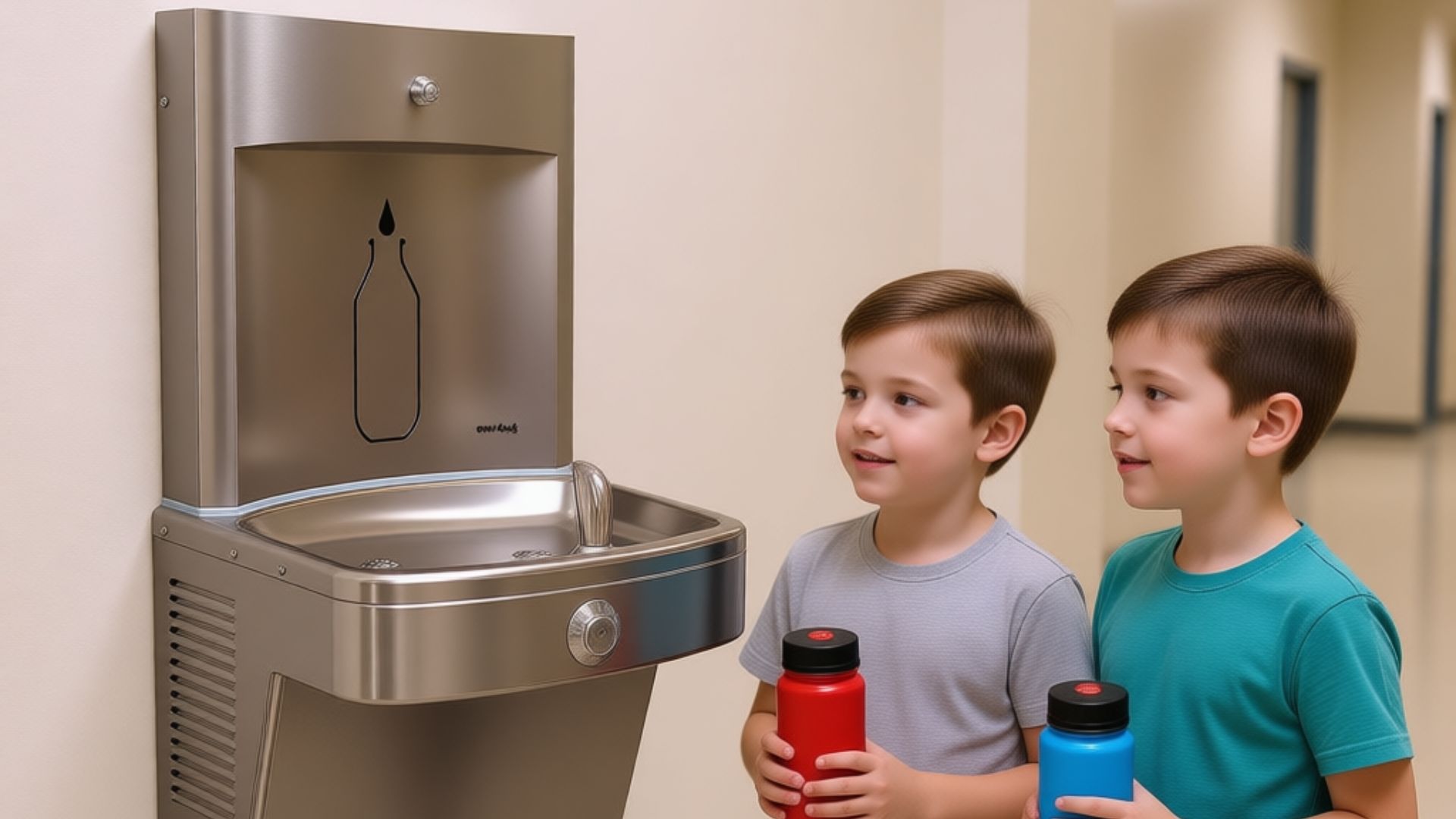
Prawidłowe nawodnienie u dzieci to temat, który z każdym rokiem zyskuje na znaczeniu — zarówno w domach, jak i w szkołach. Nasza pociechy spędzają w placówkach nawet 6–8 godzin dziennie, często w ciągłym ruchu i skupieniu. To właśnie w tym czasie organizm najbardziej potrzebuje wody, aby dobrze funkcjonować.
Nic więc dziwnego, że szkolne źródełka wody stają się coraz popularniejsze — zapewniają dzieciom łatwy, bezpieczny i higieniczny dostęp do wody przez cały dzień.
Przyjrzyjmy się, ile wody naprawdę potrzebują dzieci, dlaczego woda jest najlepszym wyborem i na co zwrócić uwagę przy wyborze źródełka do szkoły.
Zapotrzebowanie na wodę zależy od wieku, aktywności, temperatury otoczenia czy rodzaju spożywanych posiłków, ale istnieją ogólne zalecenia:
Ważne: nawet 20–30% tego zapotrzebowania pochodzi z jedzenia (np. z owoców i warzyw), ale największą część powinny stanowić napoje — przede wszystkim woda.
W sklepikach i automatach szkolnych nadal można znaleźć soki, napoje „owocowe”, herbatki smakowe czy napoje gazowane. Choć kuszą kolorami i słodkim smakiem, nie są dobrym źródłem nawodnienia.
Najczęściej zawierają:
❌ dużo cukru – nawet 8–12 łyżeczek w jednej butelce!
❌ barwniki i aromaty
❌ szkodziące zębom kwasy
❌ niekiedy kofeinę, która działa odwadniająco
Efekt?
Wahania energii, gorsza koncentracja, większa ochota na podjadanie oraz ryzyko nadwagi.
Woda pozostaje najlepszym źródłem nawodnienia — neutralna, zdrowa, bez kalorii i najlepiej gasząca pragnienie.
Źródełka w szkołach to rozwiązanie, które łączy wygodę, ekologię i zdrowie.
Oto dlaczego coraz więcej placówek decyduje się na ich montaż:
Dzieci mogą pić, kiedy chcą — bez wychodzenia z budynku i bez kupowania droższych napojów.
Gdy woda jest „pod ręką”, dzieci naturalnie sięgają po nią częściej.
Brak jednorazowych butelek to mniej plastiku i mniej odpadów.
Placówka nie musi kupować wody w galonach, a rodzice — butelek do szkoły.
Uczniowie mogą napełnić bidon w drodze na lekcję, na przerwie lub po WF-ie.

Wybór źródełka nie powinien być przypadkowy. Sprzęt musi być dopasowany do warunków szkolnych, intensywnego użytkowania i bezpieczeństwa najmłodszych.
To klucz. Źródełko powinno:
Dla dzieci liczy się przede wszystkim prostota i intuicyjne działanie.
Łatwo dostępny przycisk, odpowiednia wysokość i szybki wypływ wody ułatwiają korzystanie nawet maluchom.
Idealne źródełko powinno:
To jeden z najważniejszych elementów.
Dobre filtry redukują:
Dzieci chętniej piją wodę, która jest smaczna.
Gładkie powierzchnie, brak zakamarków, szybkie czyszczenie — to obowiązek w miejscach, gdzie z urządzenia korzystają setki uczniów dziennie.
Szkoła to miejsce intensywnego użytkowania.
Źródełko powinno być:
Dostęp do świeżej, filtrowanej wody to jedna z najprostszych i najskuteczniejszych form dbania o zdrowie i dobre samopoczucie dzieci.
Dzięki szkolnym źródełkom uczniowie piją więcej, częściej i chętniej — a to przekłada się na:
✔️ lepszą koncentrację
✔️ większą energię
✔️ zdrowsze nawyki
✔️ mniejszą ilość śmieci
Woda jest najlepszym napojem dla każdego dziecka — a dzięki nowoczesnym źródełkom picie jej staje się jeszcze łatwiejsze.
In this section you will find a range of practical information related to our solutions. In the articles, we share our experience, discuss implementation steps and highlight good practices. It is a reliable source of information and advice on the provision of drinking water in public spaces, the legal regulations in this area, the benefits of installing drinking water dispensers and the technological aspects in this field.
We look forward to reading!

Woda z kranu od lat budzi emocje – jedni piją ją bez wahania, inni podchodzą do tematu ostrożnie, a część osób wybiera butelkowaną, mimo że wcale nie musi. Tymczasem globalne raporty i wyniki kontroli pokazują, że jakość wody wodociągowej w wielu krajach jest bardzo wysoka – nierzadko wyższa niż jakość niektórych wód sprzedawanych w plastikowych butelkach.
Dlaczego więc jedni ufają kranówce, a inni wciąż mają obawy? Jak to wygląda w Polsce? I co sprawia, że coraz więcej osób świadomie wybiera wodę prosto z sieci lub korzysta z nowoczesnych dystrybutorów? O tym w dzisiejszym artykule.
Jakość wody wodociągowej zależy przede wszystkim od lokalnej infrastruktury i standardów sanitarnych. W wielu krajach Europy Zachodniej, Ameryki Północnej czy Australii kranówka jest nie tylko bezpieczna, ale wręcz promowana jako najlepsze źródło wody pitnej.
W państwach tych woda podlega ciągłym, restrykcyjnym kontrolom, normy jakości są bardzo wysokie, proces uzdatniania jest wieloetapowy i nowoczesny.
Są jednak regiony, gdzie dostęp do bezpiecznej wody jest nadal wyzwaniem – dotyczy to głównie części Afryki, Azji oraz Ameryki Południowej. Tam picie wody prosto z kranu może być ryzykowne, a mieszkańcy korzystają z wody butelkowanej lub systemów filtracji domowej.
Wbrew obiegowym opiniom, woda kranowa w Polsce spełnia rygorystyczne normy europejskie i jest regularnie badana przez sanepid oraz zakłady wodociągowe. W wielu miastach jakość tej wody jest na poziomie porównywalnym z wodą w krajach zachodnich.
Dlaczego więc część osób nadal nie ufa kranówce?
Najczęstsze obawy to:
Co ciekawe, rośnie jednak grupa osób, które piją wodę prosto z kranu – w dużych miastach to już standard, wspierany kampaniami edukacyjnymi i inicjatywami proekologicznymi.
Powodów jest kilka – wszystkie bardzo racjonalne.
1. Oszczędność pieniędzy – Pijąc kranówkę:
2. Wygoda – Nie trzeba:
Woda jest zawsze pod ręką – czysta, świeża i dostępna w każdej chwili.
3. Ekologia i mniejsza produkcja plastiku – Każda rezygnacja z butelki PET to:
To właśnie względy ekologiczne napędzają wiele globalnych kampanii zachęcających do picia kranówki.
4. Świadomość zdrowotna – Rośnie trend odchodzenia od napojów słodzonych na rzecz wody. Społeczeństwo wie coraz więcej o:
Dla tych osób powstają nowoczesne dystrybutory i urządzenia do filtracji wody kranowej. To rozwiązania, które zapewniają pełen komfort i bezpieczeństwo, a jednocześnie wpisują się w ekologiczne trendy.
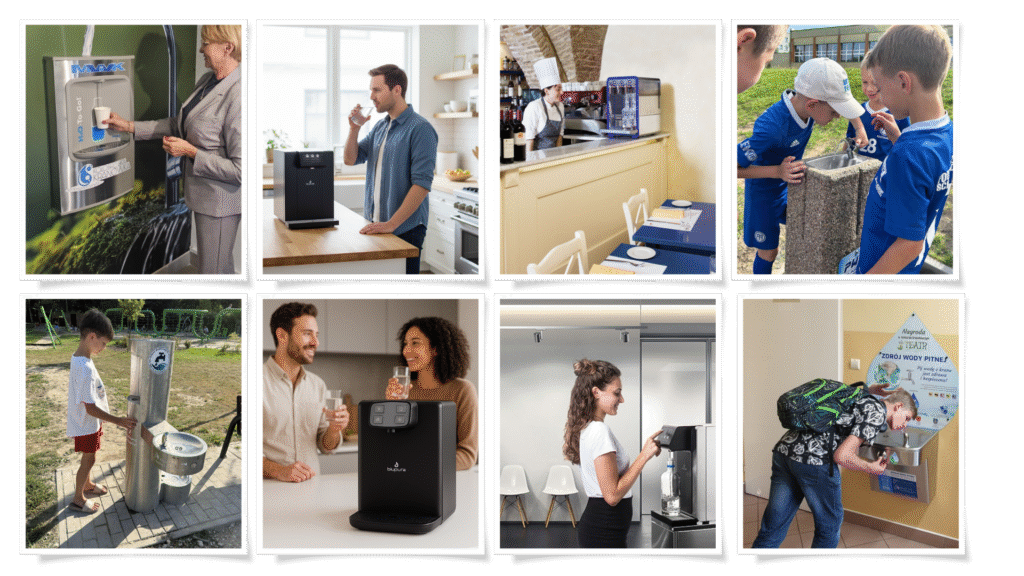
Nowoczesne dystrybutory oferują m.in.:
Co ważne – takie urządzenia sprawdzają się:
Nasza oferta obejmuje szeroki wybór dystrybutorów – od kompaktowych modeli do kuchni, po profesjonalne rozwiązania przemysłowe i instytucjonalne. Każdy znajdzie wariant dopasowany do swoich potrzeb.
✔ wygodny i stały dostęp do świeżej wody
✔ wysoka jakość dzięki filtracji i zabezpieczeniom
✔ możliwość wyboru wody gazowanej, chłodnej lub ciepłej
✔ redukcja kosztów zakupu wody butelkowanej
✔ ograniczenie plastiku i dbałość o środowisko
✔ estetyka – urządzenia pasujące do nowoczesnych wnętrz
✔ bezobsługowość i higiena dzięki systemom UV
Świat idzie w kierunku rozwiązań ekologicznych, wygodnych i ekonomicznych – a picie wody kranowej doskonale wpisuje się w te wartości.
W Polsce jakość wody z sieci wodociągowej jest bardzo dobra, świadomość rośnie, a nowoczesne urządzenia filtrujące i dystrybutory pozwalają cieszyć się:
💧 lepszym smakiem,
💧 pełnym bezpieczeństwem,
💧 wygodą,
💧 niższymi kosztami,
💧 i mniejszą produkcją plastiku.
To prosty krok, który realnie wpływa na nasze zdrowie, komfort i środowisko.
In this section you will find a range of practical information related to our solutions. In the articles, we share our experience, discuss implementation steps and highlight good practices. It is a reliable source of information and advice on the provision of drinking water in public spaces, the legal regulations in this area, the benefits of installing drinking water dispensers and the technological aspects in this field.
We look forward to reading!

Publiczne źródła wody pitnej nie są współczesnym wynalazkiem. Pierwsze instalacje pojawiły się już w XIX wieku w Ameryce Północnej, gdzie stały się jednym z filarów rozwijającej się infrastruktury miejskiej. Ich celem był łatwy dostęp mieszkańców do czystej, bieżącej wody – zarówno ze względów zdrowotnych, jak i sanitarnych.
Dziś ta idea wraca w nowoczesnej, ekologicznej odsłonie. W obliczu walki z plastikiem i rosnącej świadomości społecznej, zewnętrzne zdroje wody pitnej stają się symbolem przyszłościowych rozwiązań dla miast oraz instytucji.
Współczesne zdroje zewnętrzne czerpią z doświadczeń firm takich jak nasz amerykański partner Murdock Manufacturing – producenta z ponad 150-letnią historią w projektowaniu zdrojów i stacji wody pitnej. Mając na uwadze jego wieloletnie doświadczenie oraz bogata ofertę zdecydowaliśmy się na współpracę i po czasie zostaliśmy oficjalnym dystrybutorem Murdock Manufacturing na Europę.
Stawiamy na sprawdzone technologie i rozwiązania, zapewniając urządzenia odporne na warunki atmosferyczne, intensywne użytkowanie oraz akty wandalizmu. To połączenie doświadczenia, inżynierii i nowoczesnego designu.
Stal nierdzewna – klucz do trwałości. Najwyższej jakości zdroje powstają z stali nierdzewnej 304 lub 316, która:
Wibrobeton – solidność, o której często się nie mówi. To materiał o ponadprzeciętnej odporności, idealny do przestrzeni miejskiej. Świetnie znosi intensywne użytkowanie i działa wandaloodpornie.
Konstrukcje odporne na zniszczenia. Trwałość to nie tylko materiał — to również:

Nalewak do butelek. W dobie bidonów wielokrotnego użytku nalewak to już standard. Wygodny, szybki i higieniczny — pozwala ograniczyć zużycie jednorazowych butelek plastikowych.
Pedały nożne i bezdotykowe uruchamianie. To nie tylko wygoda, ale i wyższy poziom higieny — szczególnie ważny w przestrzeni publicznej.
Misy o różnych wysokościach. Dostosowane do:
Stacje do mycia rąk. Przydatne na placach zabaw, w parkach, przy ścieżkach rowerowych czy w pobliżu boisk.
Zdroje świetnie sprawdzają się:
To miejsca, gdzie dostęp do wody jest realną korzyścią — i użytkownicy natychmiast to doceniają.
Zewnętrzne zdroje wody pitnej to przykład, jak mała infrastruktura może realnie poprawić codzienne życie mieszkańców. Łączą wygodę, ekologię i estetykę, a dzięki materiałom takim jak stal nierdzewna czy wibrobeton są inwestycją na lata. Nic dziwnego, że coraz więcej miast, szkół i inwestorów wybiera właśnie takie rozwiązania.
In this section you will find a range of practical information related to our solutions. In the articles, we share our experience, discuss implementation steps and highlight good practices. It is a reliable source of information and advice on the provision of drinking water in public spaces, the legal regulations in this area, the benefits of installing drinking water dispensers and the technological aspects in this field.
We look forward to reading!
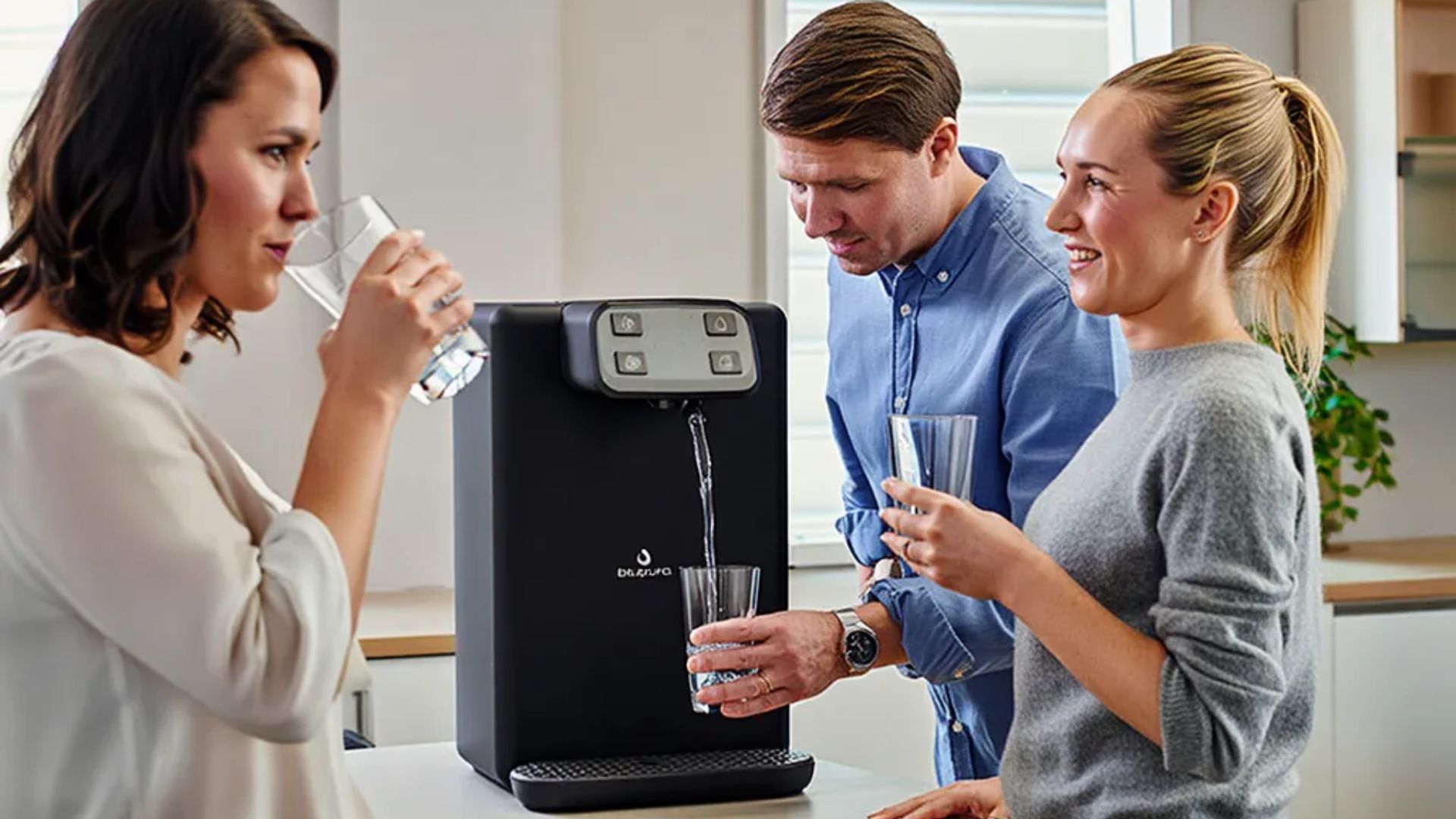
Jeszcze kilka lat temu źródełka wody pitnej w Polsce były rzadkością. Dziś coraz częściej spotykamy je w szkołach, urzędach, na uczelniach, w biurach czy przychodniach. To nowoczesne, ekologiczne i praktyczne rozwiązania, które sprawiają, że dostęp do czystej wody staje się powszechny.
Zdroje zewnętrzne idealnie sprawdzają się w parkach, przy deptakach, na rynkach miast czy placach zabaw. Korzystają z nich mieszkańcy, turyści i sportowcy. Coraz więcej samorządów uwzględnia je w swoich planach inwestycyjnych, doceniając ich zalety:
To nie tylko udogodnienie, ale też element świadomej polityki ekologicznej miast – mniej plastikowych butelek to czystsze środowisko i mniejsze koszty gospodarki odpadami.

Moda na picie wody prosto z kranu przenosi się także do domów. Coraz więcej osób szuka alternatywy dla wody butelkowanej – rozwiązania, które pozwoli im pić świeżą, smaczną wodę każdego dnia, bez dźwigania zgrzewek i bez generowania plastikowych odpadów.
Dystrybutory wody do domu to urządzenia, które filtrują, chłodzą i gazują wodę, zapewniając stały dostęp do:
Urządzenia mają kompaktową budowę – przypominają ekspresy do kawy lub eleganckie krany kuchenne, a cały system filtrujący i chłodzący można ukryć w szafce kuchennej, a cały system filtrujący, chłodzący i gazujący można ukryć w szafce pod zlewem.
Nasze dystrybutory wyposażone są w wydajne filtry, które usuwają zanieczyszczenia i poprawiają smak wody. Na życzenie klienta urządzenia mogą być doposażone w lampy UV, które działają antybakteryjnie, zapewniając maksymalny poziom higieny.
Kupowanie wody w butelkach staje się coraz droższe i mniej wygodne. Rosną ceny napojów, wprowadzany jest system kaucyjny, a do tego dochodzi konieczność noszenia ciężkich zgrzewek i zwrotu opakowań.
Co więcej, nie zawsze wiemy, w jakich warunkach woda butelkowana była przechowywana. Palety stojące na słońcu to częsty widok – a plastik pod wpływem temperatury może przenikać do wody, pogarszając jej jakość.
| Rodzaj wody | Średni koszt za 1 litr | Koszt miesięczny (dla 4-osobowej rodziny pijącej po 2 litry dziennie/os.) | Uwagi |
| Woda butelkowana (0,5–1,5 l) | ok. 1,50 zł/l | ok. 360 zł/miesiąc | Często wyższy koszt, generuje odpady plastikowe |
| Woda z kranu (bez dystrybutora) | ok. 0,004–0,01 zł/l | ok. 1–2 zł/miesiąc | Najtańsze rozwiązanie, ale bez filtracji i chłodzenia |
| Woda z dystrybutora domowego (filtr + CO₂) | ok. 0,10–0,15 zł/l | ok. 24–36 zł/miesiąc | Stały dostęp do wody filtrowanej, chłodnej i gazowanej |
Oszczędność? Nawet ponad 300 zł miesięcznie!
Do tego mniej plastiku, mniej noszenia i mniej śmieci.
Źródełka i dystrybutory wody to już nie moda, ale świadomy wybór – w trosce o zdrowie, środowisko i domowy budżet. Samorządy doceniają zalety publicznych zdrojów, a coraz więcej osób przekonuje się, że warto mieć swoje źródło czystej wody także w domu.
Niech Twoja woda będzie zawsze świeża, smaczna i dostępna na wyciągnięcie ręki – bez plastiku, bez stresu, bez kompromisów.